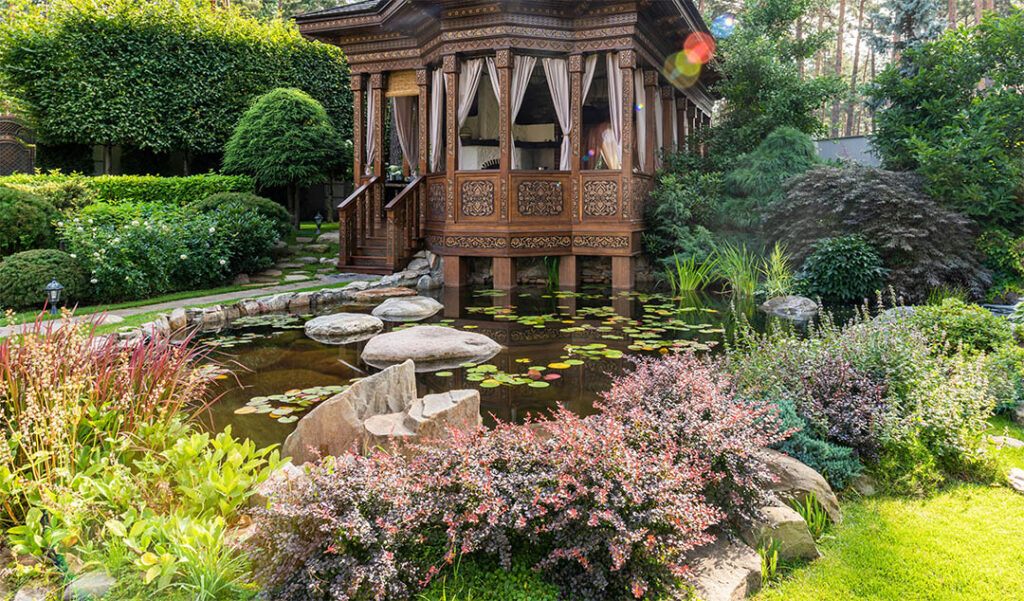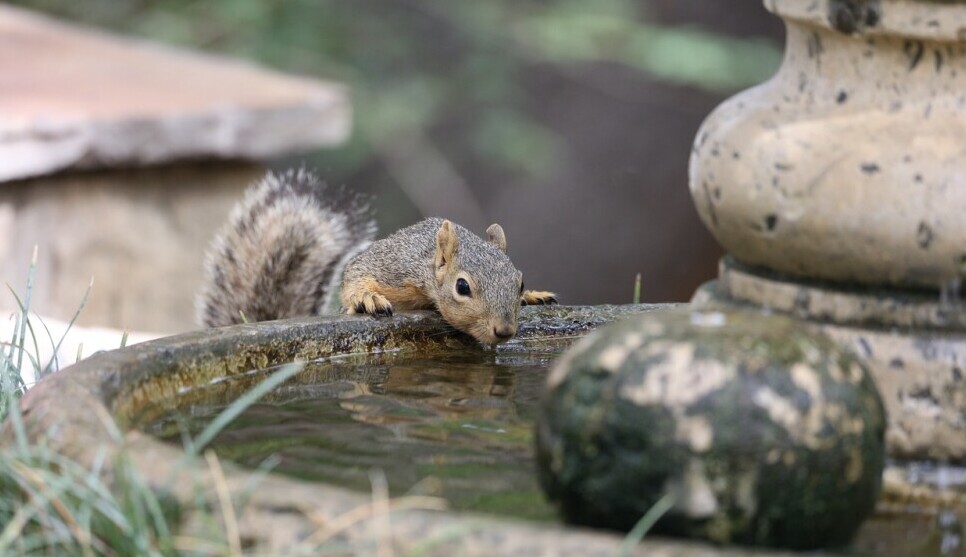
As we step into the serene world of garden design, one element stands out as a timeless addition to any outdoor space: the water fountain. There’s something magical about the sight and sound of water cascading gently, adding a layer of tranquility and beauty to your garden.
The water fountain is not just a decorative feature but also a way to promote biodiversity, reduce noise pollution, and create a microclimate that’s beneficial for plants and wildlife.
Here we’ll dive into the world of popular materials for garden water fountains, exploring their unique characteristics, advantages, and maintenance tips. Hopefully it would be helpful for you to choose one right fountain for your garden.
Resin Water Fountains: Versatility in Design
Resin is like that all-rounder buddy in your group—super adaptable and up for anything. This material scores big time with garden enthusiasts because it can mimic the look of stone or rock without the heavy lifting, both literally and on your wallet.
Got a vision for your garden? Resin’s ready to transform it into reality with an array of shapes and styles to fit any vibe you’re going for.
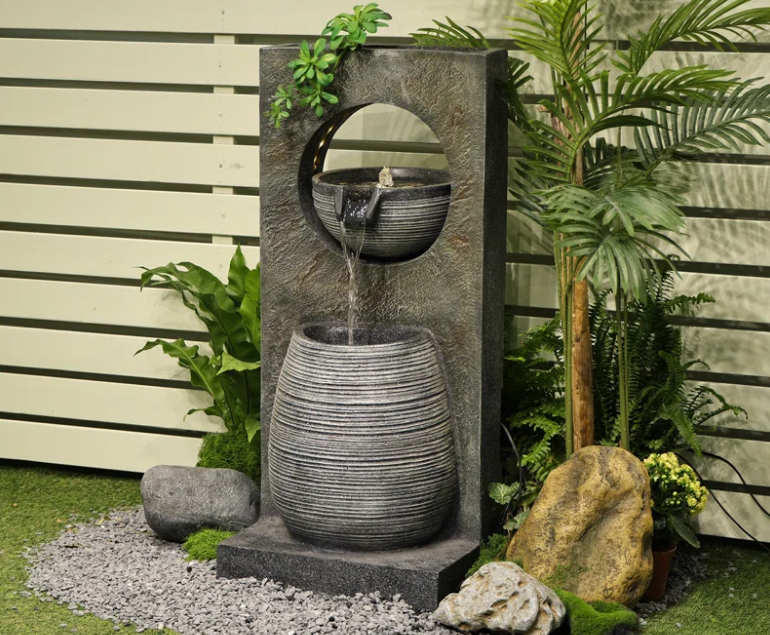
Pros:
When it comes to the upside of resin fountains, it’s all about choices. You can have your pick of natural looks that blend in seamlessly with your garden’s aesthetic, or modern ones to complement your contemporary accent in your space.
And let’s not forget how lightweight they are, making them a breeze to set up and move around.
Cons:
Well, there’s a small catch. Like that favorite pair of jeans, resin can fade under the sun over time. But before you chuck the idea, a little care and attention can slow down that process.
Consider adding a UV protectant spray to your garden shopping list to keep your fountain looking fresh.
Don’t sweat the upkeep, either. A quick clean now and then, along with checking for any algae buildup, ensures your fountain stays in tip-top shape. It’s like having a pet plant—give it some love and it’ll thrive. Whether you decide to nestle it among the flowers or make it the star of the yard, resin is here to make your fountain dreams happen.
Metal Water Fountains: Sleek and Robust Solutions
Metal fountains bring that touch of modern elegance your garden might just be craving. Copper, stainless steel, or brass—each metal has its unique charm, but what they all boast is an undeniably sleek appearance.
If you’re into streamlined, clean lines in your outdoor space, metal might be the way to go.
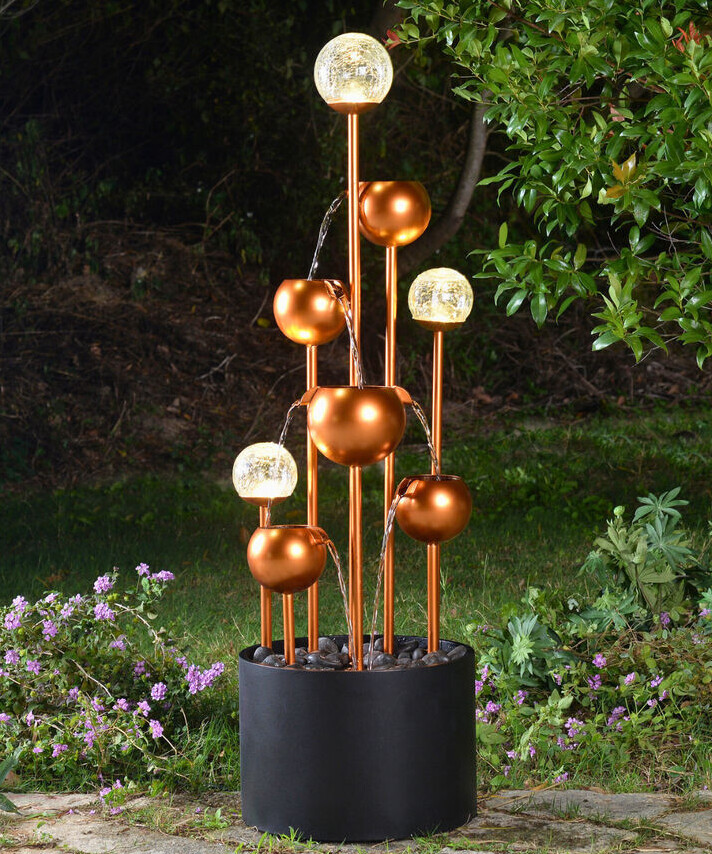
Pros:
The real win with metal fountains is their durability and how low-maintenance they are. A quick wipe down every once in a while will keep them gleaming. Plus, they’re quite robust against the whims of weather, making them a trusty companion year-round.
Metal offers an exciting range of customization options, from shiny, reflective surfaces to aged, patinated finishes. You can get creative with your style choices to tailor perfectly to your garden’s personality.
Cons:
But wait up, here’s something to keep in mind. Metals can rust, especially if they’re not treated or sealed properly. Fear not, though—a protective finish or a rust-preventive coating can do wonders. Just a bit of regular check-ups and you’ll keep rust at bay.
Concrete Water Fountains: Strength and Stability
Concrete fountains are like the unsung heroes of garden landscaping—they bring a sturdy, no-nonsense vibe that just lasts and lasts. When you’re on the lookout for something that can weather all seasons and still keep standing strong, concrete fountains are the real MVPs.
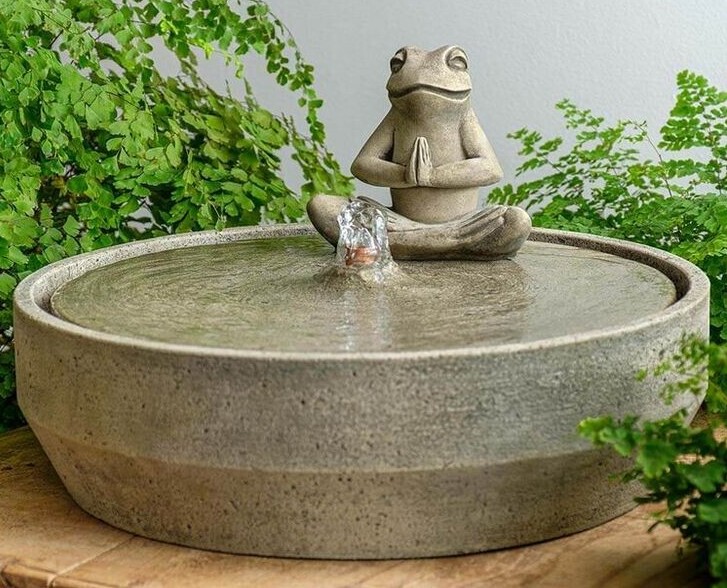
Pros:
One of the main attractions of concrete is its durability. It’s practically built to withstand everything Mother Nature throws at it. Once it’s set in your garden, you can pretty much consider it a permanent feature, which is great if you’re not into seasonal swaps.
And concrete is a gem when it comes to eco-friendliness too; it’s often made from recycled materials, making it a solid choice for environmentally conscious gardeners.
Cons:
Now, some might find them a bit on the heavy side—literally. These bad boys can be a challenge to move once they’re in place, so it’s crucial to pick the perfect spot and get the help you need to install them safely. But once that’s sorted, you can trust concrete to hold its ground.
Thinking creatively, concrete doesn’t have to be all about that raw, industrial look. Textures and colors can be added to give it a more polished or even rustic appeal.
Picture it nestled among lush greenery, creating a lovely contrast that highlights both the fountain and your plants.
Ceramic Water Fountains: Artistic and Easy to Maintain
If you’re after a splash of color and artistry in your garden, ceramic fountains definitely know how to deliver.
These pieces can be real showstoppers, adding a pop of whimsy or elegance depending on their design, and they’re straightforward to keep looking pristine.
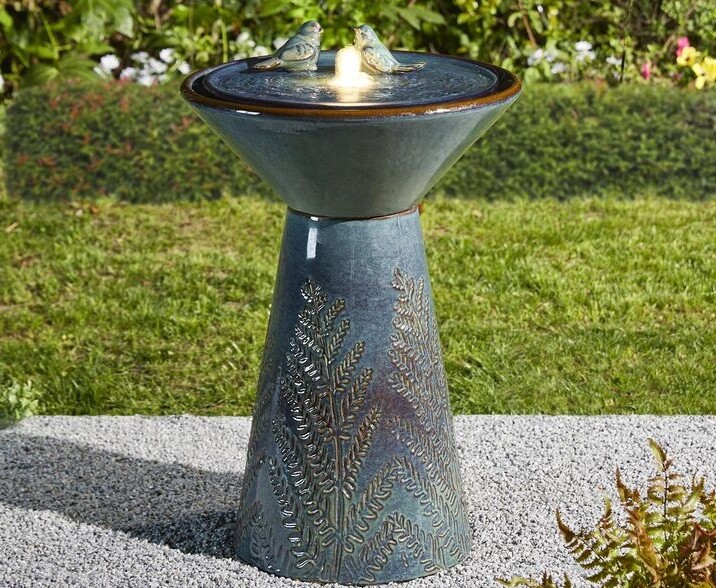
Pros:
One big perk of ceramic is how neat and easy it is to maintain. Unlike materials that demand constant upkeep, ceramics are mostly hassle-free. A little soapy water and a soft cloth can usually do the trick, leaving your fountain glistening with minimal effort.
The charm of ceramic lies in its versatility. Whether you choose a piece glazed with striking blues or earthy tones, there’s no end to the creativity they bring.
Even better, ceramics age gracefully, sometimes developing a unique patina that adds even more character to your garden arrangement.
Installation is a breeze for the most part, making a ceramic fountain a friendly choice for both beginners and seasoned gardeners. While they bring the wow factor visually, they also keep maintenance low-key, so you can enjoy more of the relaxation your garden is supposed to offer.
Cons:
But heads up—ceramics do have their Achilles’ heel when it comes to chilly weather. They can crack if temperatures drop too low. No worries, though; just think ahead and consider bringing them indoors or giving them a snug, insulated cover during those frosty months. You’ll preserve their beauty without skipping a beat.
Marble Water Fountains: Timeless Elegance
Marble fountains are like the fine wine of garden aesthetics—timeless, classic, and they only get better with age. If you’re looking to make a statement and elevate your outdoor space, marble’s heavyweight beauty commands attention.
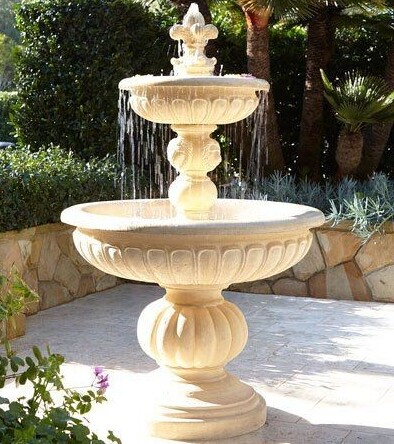
Pros:
What makes marble a standout is its robustness and elegance. It can withstand the elements while adding a premium touch that few other materials can match. Its natural veining and smooth finish bring a luxurious look that’s hard to beat.
But, let’s keep it real—marble does come with a heftier price tag. It’s an investment in your garden’s long-term appeal. If you’re ready to splurge a bit, it can be a centerpiece that elevates everything around it.
Cons:
One thing to consider is its weight. Marble fountains are solidly built, so you’ll need to plan installation carefully. Professional help can be a wise choice to secure it in place, ensuring safety and stability.
Despite the cost and weight, the allure of marble lies in its timelessness. It has a way of blending with different landscaping styles, from classic to contemporary, always maintaining a touch of class.
Maintenance is relatively straightforward too, typically needing just an occasional wipe down to keep it looking pristine.
Deciding on a marble fountain is more than choosing a feature—it’s about adding enduring charm to your garden that enhances its beauty year after year.
Conclusion: Choosing the Right Water Fountain Material
Each material for garden fountain has its unique characteristics, and the choice ultimately depends on your climate, budget, and aesthetic goals. Personal reflection on your taste, location, and maintenance ease is crucial when selecting a fountain. Remember, the right water fountain can transform your garden into an oasis of tranquility and beauty.
So, as you make your decision, consider the benefits of each material and how they align with your garden’s needs.
Whether you choose the versatility of resin, the elegance of metal, the strength of concrete, the artistry of ceramic, or the timeless appeal of marble, a well-chosen water fountain will undoubtedly enhance your garden’s charm and provide a soothing retreat for years to come.

